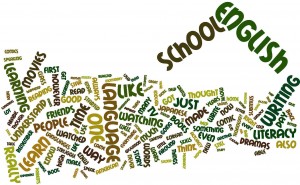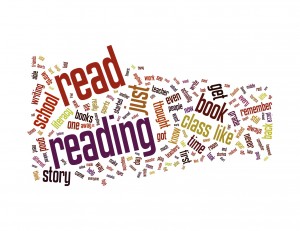An important commonality amongst our students’ narratives is the fact that each is a reference to the student’s acquisition of English. Indeed, an exploratory search of the DALN, using a variety of search terms to find the narratives about language acquisition and literacy, reveals that the majority of bilingual and multilingual participants tell their stories of coming to written or spoken English, not to their home or heritage languages. This pattern might seem obvious given that all of the contributions in the DALN that we have encountered are in English. Nevertheless, the specific attention to “English” literacy by our multilingual contributors is striking in comparison to the overall absence of references to “English” or language when discussing literacies by contributors who identify themselves as native speakers of English. The literacy narratives of English speakers tend to define and explore literacy without mentioning the language of a literacy at all.
For Suzanne’s students, Keunho, Sky, and Sofia, in the context of a college-level writing class in the U.S specifically designed for non-native speakers of “English,” perhaps the attention to English is not so surprising. Alanna’s students, Alix and Medarka, were studying in the U.S. specifically to learn all they could about English teaching methodologies, and, thus, they specifically positioned themselves as “English” teachers. In their literacy interviews, Medarka reflects on the productive practices of her own English language education, and Alix asserts during his time in the U.S. that he has learned that his own language pedogogies have been “somewhat wrong.” Both make specific the connections between literacy and English for teachers.
As teachers ourselves, we do not connect “literacy” specifically to English in our assignments or lessons. We feel we are careful to attend to the diversity of discourse communities. Our students read Mike Rose, Deborah Brandt, and a selection of DALN narratives by a diverse group of contributors, who, granted, are also published or presented in English, but who, we would argue, explicitly venerate diverse literacies. In our classrooms, we overtly discuss a very broad understanding of literacy and tell students directly that we don’t believe in Standard Written English as the only acceptable form of expression. The assignment that led to Keunho’s, Sky’s, and Sofia’s narratives explains that “a literacy narrative is a personal story about reading, writing, or composing in any form or context,” which Suzanne hopes leads students to invention strategies which consider all of their literacies as fair game. Despite this attitude and approach in our classrooms, the focus on coming to English in the multilingual students’ narratives is pervasive.
This pattern, or landmark, in our landscape of multilingual narratives is a reflection of both context and of the strategies of multilingual learners. After all, both Suzanne’s and Alanna’s classes are housed in English departments, conducted in English, and therefore, give off distinctly monolingual vibes. It would seem, then, that our students chose the most rhetorically savvy move they could possibly make—a public demonstration of their proficiency in that language and discourse in which the instructor expresses herself and her course goals.
The students’ abilities to adeptly respond to the unspoken and even unintended monolingual assumptions of our literacy narrative assignments speaks volumes for Canagarjah’s assertions about the synergy and serendipity with which multilingual communicators utilize their creative agency to respond to their interlocutors and create meaning:
Participants have to be radically other-centered. They have to be imaginative and alert to make on-the-spot decisions in relation to the forms and conventions employed by the other. It is clear that communication in multilingual communities involves a different mind-set and practices from the mind-set and practices in monolingual communities. . . . Multilingual communication works because competence does not constitute a form of knowledge, but rather, encompasses interaction strategies. (931)
The nimbleness of interaction strategies observed in multilingual communities seems to translate, then, to contexts in which multilingual communicators have to apply those same strategies to monolingual situations. This is both something we should look for and celebrate in the work of our multilingual students and something we should use as a caution when designing and explaining our assignments.


